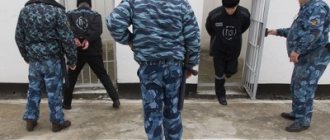Crime concept
Completeness of the crime
The crime has a formal composition. Once the attacker deprives the victim of freedom of movement, the crime is considered to be committed, regardless of where she is detained or how long it happened. Deprivation of liberty does not always mean tying the victim up or tying him to an object. It may be locked indoors.
Unlawful restraint of freedom is the forcible detention of a person in any place. The attacker's goal is to deprive the victim of freedom of movement. This is done on the basis of personal motives, but without the purpose of obtaining a ransom or material gain.
The attacker achieves his goal in the following ways:
- misrepresentation (read more here);
- physical impact;
- psychological impact;
- exposure to the use of psychotropic and narcotic substances.
Exposure may or may not pose a threat to human life and health. The punishment for the crime depends on this, among other things.
A victim is any individual, including minors.
Restriction of the victim’s freedom can be committed anywhere, for example:
- the place of permanent residence of the victim or attacker;
- at the place of work;
- in any establishment or institution;
- in any buildings or structures, including emergency, unfinished, etc.
The long-awaited document
December 10, 2022 8:28 pm
The Supreme Court will finalize clarifications on cases of kidnapping, illegal imprisonment and human trafficking
December 9,
AG reports a draft resolution on judicial practice in cases of kidnapping, unlawful imprisonment and human trafficking.
Following the discussion, the document was sent for revision. Particular attention in the draft resolution of the Plenum of the Supreme Court is paid to complex issues of qualification and exemption from liability. Advisor to the FPA RF, member of the Council of the Moscow Administration Evgeniy Rubinstein noted that the future resolution of the Plenum itself is a long-awaited document that will clarify controversial issues of qualification in criminal cases of kidnapping and restriction of freedom. According to him, the draft document has already reflected many theoretical approaches expressed by researchers about the qualification of actions resulting in human trafficking. In the preamble of the draft document with reference to Art. 22 of the Russian Constitution states that the right of every person to freedom and personal security is one of the basic inalienable rights that belong to people from birth. In the interests of protecting this constitutional right, the Criminal Code of the Russian Federation provides for criminal liability for crimes against personal freedom. Yes, Art. 126 of the Code provides for criminal liability for kidnapping, Art. 127 – for unlawful deprivation of liberty, and Art. 127.1 – for human trafficking.
Kidnapping and unlawful imprisonment
According to paragraph 1 of the draft, the social danger of the above crimes lies in the illegal restriction of a person’s physical freedom, including freedom of movement and choice of location.
In paragraph 2 it is noted that under the kidnapping of a person within the framework of Art. 126 of the Criminal Code of the Russian Federation means its seizure and movement to another place (for example, to another apartment, house, basement, garage, area) against the will of the victim and for the purpose of illegally detaining him. Kidnapping should be qualified as a completed crime from the moment of capture and the beginning of the movement of the victim. If the abducted person was not taken to another place due to circumstances beyond the control of the guilty person, this does not affect the qualification of the actions he committed as a completed crime.
Based on the explanations of paragraph 3, the courts must keep in mind that, unlike kidnapping, in case of unlawful deprivation of liberty (Article 127 of the Criminal Code of the Russian Federation), the victim remains at his location, but is limited in movement without legal grounds. For example, the guilty person locks the victim in his own house, apartment or other premises, ties him up or makes it impossible for him to leave any place in any other way. Such an act constitutes a completed crime from the moment of actual deprivation of a person’s freedom, regardless of the duration of his stay in such a state. If the guilty person, who initially illegally deprived another person of his freedom, subsequently moved the victim to another place, the act must be qualified as kidnapping under the relevant part of Art. 126 of the Criminal Code of the Russian Federation and does not require additional qualifications under Art. 127 of the Criminal Code of the Russian Federation.
The actions of the guilty person, committed in the process of kidnapping a person and consisting in illegal restriction of the freedom of the victim when moving him and (or) detaining him in another place, are fully covered by the elements of the crime provided for in Art. 126 of the Criminal Code of the Russian Federation. In this regard, they do not require additional qualifications under Art. 127 of the Criminal Code of the Russian Federation.
Philip Shishov noted that in order to correctly qualify the actions of criminals, a number of important points should be taken into account: “For example, the kidnapping of a person is considered completed from the moment the person begins to move, and if the victim does not move to another place, but is held in a place where he arrived voluntarily, then there will be no kidnapping, and we will be talking about a much milder article - “illegal deprivation of liberty.”
According to Evgeniy Rubinshtein, before such clarifications, judicial practice had formed several approaches to the qualification of this act - starting from the imputation of the totality of crimes provided for in Art. 126 and 127 of the Criminal Code of the Russian Federation, and ending with the absorption by the first of all actions covered by the second. “According to the draft document, the Supreme Court of the Russian Federation recommends using the latter approach, which seems reasonable,” he noted. “Similarly, the situation with the qualification of the actions of a person committed in the process of kidnapping and consisting in illegal restriction of the freedom of the victim when moving him and (or) detaining him in another place must be resolved.”
In accordance with clause 4 of the draft, when making a legal assessment of an act, courts must proceed from the fact that the use of violence that is not dangerous to human life or health is covered by Part 1 of Art. 126 of the Criminal Code of the Russian Federation or 127 of the Criminal Code of the Russian Federation. The use of violence dangerous to life or health when committing these acts constitutes a crime provided for in paragraph “c” of Part 2 of the above articles. In turn, the threat of murder or infliction of grievous bodily harm when committing a kidnapping is covered by paragraph “c” of Part 2 of Art. 126 of the Criminal Code of the Russian Federation. At the same time, the implementation of such a threat during unlawful deprivation of liberty should be qualified according to the totality of crimes provided for in the relevant part of Art. 127 and art. 119 (threat of murder or grievous bodily harm) of the Code.
Chairman of the ICA “Soldatkin, Green and Partners” Dmitry Soldatkin noted that in this paragraph the wording “carrying out a threat of murder or causing grievous bodily harm” is not entirely correct. “In practice, this is unlikely to be a problem, but nevertheless, making a threat to kill or cause grievous bodily harm can be literally interpreted as actual murder or causing grievous bodily harm,” the expert noted.
According to him, the same paragraph of the draft states that, in contrast to paragraph “c” of Part 2 of Art. 127 of the Criminal Code of the Russian Federation, the threat of murder or infliction of grievous bodily harm is covered by paragraph “c” of Part 2 of Art. 126 of the Criminal Code of the Russian Federation. In this regard, the totality of crimes provided for in Art. 127 and 119 of the Criminal Code of the Russian Federation, is impossible due to the absence in paragraph “c” of Part 2 of Art. 127 of the Criminal Code of the Russian Federation directly mentions threats. “From the proposed wording it also follows that the Supreme Court of the Russian Federation intends to equate the threat of murder to the threat of using life-threatening violence, which in some cases can eliminate in practice excessive imputation for the totality of crimes under Art. 119 of the Criminal Code of the Russian Federation,” warned Dmitry Soldatkin.
Clause 5 of the draft notes the obligation of the courts to take into account that when a person is kidnapped and illegally deprived of his freedom, violence or the threat of its use can be carried out both in relation to the victim and in relation to other persons (including close relatives), in order to remove obstacles to the capture , moving or restraining a person.
Evgeniy Rubinstein called this explanation interesting and reasonable. “At the same time, such actions must be qualified depending on what qualification the “main” act received - kidnapping or restriction of freedom. In accordance with the previously stated position, when a person is kidnapped, no additional qualifications are required under Art. 119, and in case of restriction of freedom, additional imputation of Art. 119 of the Criminal Code of the Russian Federation is necessary,” he explained.
Clause 6 of the draft resolution explains who the perpetrators of the crime are when qualifying kidnapping under clause “a” of Part 2 of Art. 126 of the Criminal Code of the Russian Federation as committed by a group of persons by prior conspiracy. They are recognized as persons who, in accordance with the existing conspiracy, directly committed all or part of the actions to capture and move the victim, as well as his subsequent detention in another place.
From the provisions of paragraph 7 it follows in what cases kidnapping is qualified under paragraph “h” of Part 2 of Art. 126 of the Criminal Code, that is, as committed for selfish reasons. For example, a crime was committed in order to obtain material benefits for the perpetrator or other persons or to get rid of material costs, as well as for hire in order to receive remuneration or to get rid of costs. In this regard, persons who organized the kidnapping of a person, committed by the perpetrator for material reward, instigated its commission or assisted in such a crime, are liable under the relevant part of Art. 33 and paragraph “h”, part 2, art. 126 of the Criminal Code of the Russian Federation.
According to paragraph 8, if the kidnapping of a person is associated with a simultaneous demand for the transfer of someone else’s property or the right to property or the commission of other actions of a property nature, then, if there are grounds, the actions of the perpetrator are classified as a set of crimes provided for in paragraph “h” of Part 2 of Art. 126 and the corresponding part of Art. 163 “Extortion” of the Criminal Code.
According to Dmitry Soldatkin, paragraphs 7 and 8 of the draft document must be supplemented with the wording that the totality of crimes provided for in paragraph “h” of Part 2 of Art. 126 and the corresponding part of Art. 163 of the Criminal Code of the Russian Federation, is possible in a number of cases. For example, the demand to transfer property or to perform other actions of a property nature is supported by a threat to use violence in the future, destroy or damage someone else’s property, disseminate information disgracing the victim or his relatives, or other information that may cause significant harm to the rights or legitimate interests of the victim or his relatives . Such an explanation, the lawyer emphasized, does not follow from the fact of the abduction and subsequent illegal detention of a person.
In paragraph 9 of the draft it is noted that, based on the note to Art. 126 of the Criminal Code of the Russian Federation, such release of a kidnapped person should be recognized as voluntary, in which the guilty person realized that he had a real opportunity to hold the victim, but he released him. For example, it handed over the person to relatives, authorities, and indicated to them the location of the abducted person, from where he could be released.
Within the meaning of the criminal law, the voluntary release of an abducted person does not relieve the guilty person from criminal liability for other illegal actions (including acts committed during the abduction of a person) if they contain elements of an independent crime.
Human trafficking
In accordance with the proposed clarifications in paragraph 10 of the draft, trafficking in persons can be expressed in the commission of one or more of those specified in Part 1 of Art. 127.1 of the Criminal Code of the Russian Federation of actions. Among them, for example, is the purchase, sale or other transaction in relation to a person, as well as the recruitment, transportation, transfer, harboring or receipt of a person for the purpose of his exploitation.
At the same time, the purpose of exploiting a person is a mandatory element of a crime only for such actions as recruitment, transportation, transfer, harboring or receiving a victim. The qualification of acts as trafficking in persons is also not affected by the victim’s awareness of the nature of the actions being performed on him or her and his consent to their commission.
Clause 11 states that, within the framework of Art. 127.1 of the Criminal Code, the purchase and sale of a person is understood as the commission of actions consisting of its transfer by one person to another person (persons) for a monetary reward. Other transactions in relation to a person mean other illegal actions that are not purchase and sale, but lead to the transfer of the victim from one person to another person (for example, gratuitous transfer, exchange for any material assets).
Recruitment is proposed to be considered the search, selection and hiring of persons to perform in the interests of the employer or other persons any work, provision of services or implementation of other activities, including on the territory of a foreign state, carried out for the purpose of further exploitation of the recruited person. The promise of reward, blackmail, deception or breach of trust may be used to obtain the victim's consent.
Transportation, according to the draft resolution, should be considered the movement of a person by any type of transport from one place to another (including within the same locality) for its further exploitation. The transfer of a person consists of providing the victim to another person, including for transportation, concealment, and exploitation of the victim, and receiving is the acceptance of the victim. In turn, concealing a person consists of hiding the victim from authorities, relatives, interested parties (for example, by falsifying documents proving his identity).
“The value of such clarifications is undeniable, since it lies in detailing the objective side of human trafficking, defining what is meant by the purchase and sale of a person and other transactions in relation to him, as well as the terms “recruitment”, “transportation”, “transfer” and “Concealment,” noted Alexey Ivanov.
As Philip Shishov explained, human trafficking committed in the form of recruitment will be considered completed from the moment the victim agreed to a job offer received from the criminal: “For example, if recruitment is carried out by a criminal by posting an advertisement on the Internet for a job, then If such an offer is accepted by the victim, even in the absence of any further consequences for him, the crime of “trafficking in persons” will be considered completed.”
As follows from paragraph 12, the courts must determine the moment of completion of the crime under Art. 127.1 of the Criminal Code of the Russian Federation, depending on the type of actions committed. When making a purchase or sale of a person or other transactions in relation to the victim, the crime is qualified as completed upon the actual transfer and receipt of the victim. When recruiting a person - from the moment of obtaining the consent of the victim to carry out the activity for which he was recruited. When committing other actions, the act is qualified as a completed crime upon transfer or receipt of a person or from the moment he begins to be transported or concealed for the purpose of exploitation.
Clause 13 of the draft explains that if the purchase and sale of a person or the commission of other actions related to human trafficking with him was preceded by his abduction, the act constitutes a set of crimes provided for in the relevant parts of Art. 126 and 127.1 of the Criminal Code of the Russian Federation. The illegal deprivation of a person’s freedom for the purpose of carrying out actions against him related to human trafficking, as well as the illegal restriction of the freedom of the victim in the process of committing these actions, are covered by the relevant part of Art. 127.1 of the Code.
In paragraph 14 it is noted that actions related to human trafficking, committed with the use of violence, both posing and not posing a danger to the life or health of the victim, as well as with the threat of its use, should be qualified under paragraph “e” of Part 2 Art. 127.1 of the Criminal Code of the Russian Federation.
As follows from paragraph 15 of the draft, in the note to Art. 127.1 of the Criminal Code of the Russian Federation notes in which cases a person who has committed a crime for the first time under Part 1 or Clause “a” of Part 2 of this article is exempt from criminal liability. For example, it voluntarily released the victim(s) and contributed to the solution of the crime committed with his participation, provided that his actions did not constitute another crime. At the same time, the voluntary release of the victim(s) does not relieve the guilty person from criminal liability for other illegal actions (including acts committed during human trafficking) if they contain elements of an independent crime (for example, the production or use of counterfeit documents).
Paragraph 16 of the draft resolution contains a recommendation to the courts, when considering the above acts, to identify the circumstances that contributed to their commission, as well as other violations of the law, for example, those committed during the preliminary investigation or when considering a criminal case by a lower court. In this regard, they have the right to make private determinations (decisions) in order to draw the attention of relevant organizations and officials to them.
“The recommendation seems correct to identify violations of the law committed during the preliminary investigation or during the consideration of a criminal case by a lower court, but this recommendation is of a general nature, which should be unconditionally applied by the law enforcement officer regardless of the category of the case under consideration,” says Alexey Ivanov.
At the same time, the expert called the recommendation of the Plenum of the Supreme Court, when considering criminal cases of kidnapping, illegal imprisonment and human trafficking, to identify the circumstances that contributed to the commission of crimes ambiguous, since this should be dealt with by the investigation, but not the court. “The court can use this recommendation when assigning the final punishment, which can only cause a worsening of the defendant’s situation,” noted Alexey Ivanov.
SharePrint Direct link to the material:
Share
Unlawful imprisonment. Difference from related crimes. (Article 127)
A crime similar in composition is kidnapping (in other words, kidnapping), the penalties for which are provided for in Art. 126 of the Criminal Code of the Russian Federation. The main difference is that in a kidnapping the victim is necessarily forcibly removed. Kidnapping can be for selfish, material purposes, or based on personal motives.
Partially similar in composition, but with a more severe punishment, is the crime provided for in Art. 206 of the Criminal Code of the Russian Federation - hostage taking. It involves not only the unlawful deprivation of liberty of individuals, but also the compulsion of the state, organization or person to fulfill the demands of the kidnapper. Hostage taking almost always occurs with the use of force, weapons and is dangerous to the life and health of the victims.
The objective side is the illegal deprivation of a person’s freedom, not related to his abduction. During unlawful deprivation of liberty, a person is not removed from his place of residence, is not moved to another place, as is the case with abduction, but he is limited in freedom of movement in space.
The victim is held against his will in the place where he was deprived of his freedom. A mandatory feature of the objective side of the crime is the illegality of deprivation of freedom, which means the absence of legal grounds for depriving a person of freedom.
If deprivation of liberty is carried out as a preventive measure or during arrest on suspicion of committing a crime, it cannot be considered illegal. An arrest made in conditions of extreme necessity or during the detention of a criminal is not considered illegal.
The elements of the crime by design are formal, i.e. the crime is considered completed from the moment the person is actually deprived of his freedom.
Composition provided for in Part 3 of Art. 127 of the Criminal Code of the Russian Federation, when we are talking about consequences in the form of the death of the victim or other serious consequences, it is material.
We invite you to read: Driving without a license after deprivation in 2019: 4 tricks for driving without a license
The subjective side is direct intent; Part 3 of this article provides for two forms of guilt - intent in relation to the act and negligence in relation to the death of the victim or other grave consequences.
Neither the purpose nor the motive for deprivation of liberty matter for the qualification of the act. The subject of the crime is a sane individual who has reached the age of 16. Kidnapping (Art.
126 of the Criminal Code of the Russian Federation) The immediate object of the crime is human freedom.
The objective side is expressed in an act in the form of an action, i.e., removing a person against his will from the place where he is, moving him to another place and holding him against his will. Abduction can be carried out by any means, but they do not matter for qualifying the crime.
The crime is considered completed from the moment the victim is removed and moved to another place. The time during which he is held has no significance for qualification. The subjective side is characterized by direct intent. The subject is a physically sane person who has reached the age of 14 years.
– will voluntarily release the kidnapped person; – his actions do not contain any other crime.
Qualifying features of Parts 2 and 3 of Art. 127 of the Criminal Code of the Russian Federation coincide with the qualifying features of Parts 2 and 3 of Article 126 of the Criminal Code of the Russian Federation, with the exception that in Part 2 of Art. 126 of the Criminal Code of the Russian Federation there is no sign of an act being committed for selfish reasons and no indication of a threat of violence (clause “c”, “z”, part 2).
The difference between kidnapping and unlawful deprivation of liberty lies in the method of committing the act. Abduction always involves taking possession of a person and moving him to another place against his will, where he is held. Unlawful deprivation of liberty is not associated with confiscation. The victim of his own free will comes to a certain place where he is forcibly detained
– purchase and sale of a person – under this agreement, one party (seller) undertakes to transfer the thing (product) into the ownership of the other party (buyer), and the buyer undertakes to accept this product and pay a certain amount of money (price) for it;
– his recruitment is an activity aimed at reaching an agreement on the exploitation of people (searching for candidates, persuading them through promises, deception, threats, etc.
); – its transportation – the movement of a person to the place where it will be exploited, by any type of transport; – its transfer – the actions of an intermediary in the commission of actions specified in the law for human trafficking, as well as the subsequent transfer to other persons of the victim after its purchase and sale by the buyer himself, for example, for temporary accommodation and residence ,uses, etc.;
- – his concealment – hiding a person for the purpose of his exploitation;
- – its receipt is actions opposite to transmission.
- The subjective side of the crime: – direct intent;
– special purpose – human exploitation, i.e. the use of prostitution by other persons and other forms of sexual exploitation, slave labor (services), servitude. The subject of the crime is common.
A person is exempt from criminal liability for committing this crime if the following conditions are met: the person committed acts of purchase and sale of one, two or more people, or their recruitment, transportation, transfer, harboring or receipt for the purpose of their exploitation; this crime was committed for the first time;
The immediate object of the crime is a person’s personal freedom.
The objective side is the use of slave labor, that is, the use of the labor of a person in respect of whom the powers inherent in the right of ownership are exercised, if the person, for reasons beyond his control, cannot refuse to perform work (services).
The subjective side is direct intent. The subject of the crime is general.
General qualifying and special qualifying features for these compounds are the commission of an act: in relation to two or more persons; in relation to a known minor; by a person using his official position; with the use of violence or the threat of its use; with the seizure, concealment or destruction of documents identifying the victim;
We invite you to read: Repeated deprivation of a driver’s license for drunkenness in 2022
– moving the victim across the State border of the Russian Federation or illegally detaining him abroad; – using forged documents;
– for the purpose of removing organs or tissues from the victim; – committed in a manner dangerous to the life and health of many people. Art. 127.2 of the Criminal Code of the Russian Federation – committing an act using blackmail.
Unlike kidnapping, which is associated with his capture, movement and retention, with unlawful deprivation of liberty the victim is not captured, is not taken from his environment, is not abducted, but remains in place, but is limited in movement.
The direct object of the crime is social relations that ensure the personal (physical) freedom of a specific victim(s). An optional object may be the safety of life, health of the victim, his relatives, property relations, etc.
The victim can be any person, regardless of gender, age, ability to recognize the fact of deprivation of liberty, etc.
The objective side of the crime is expressed in the commission of actions consisting of a real deprivation or restriction of the personal freedom of the victim, not related to his abduction.
The victim is illegally, forcibly, against his will, held in the place where he himself had been voluntarily before, and is deprived of the opportunity to move at his own discretion.
Certain difficulties are presented by cases when the victim is not isolated, he is not, as it were, deprived of the opportunity to move at his own discretion, but does not do this under the influence of a threat expressed to him of murder or harm to health if he leaves his place of stay on his own, for example, leaves his apartment for street.
There are different points of view on this issue.
Some authors propose to qualify such actions as unlawful deprivation of liberty, others express doubts about this, believing that this issue must be resolved legislatively, others believe that it is not unlawful deprivation of liberty to prohibit a person, under the threat of murder, from leaving the boundaries of a populated area, not to visit certain areas of the city.
Deprivation of liberty leads to the isolation of a person from society and the usual environment. The arrest, imprisonment, detention and detention of citizens is carried out by representatives of the authorities, authorized officials in the manner prescribed by law.
Citizens can deprive another person of liberty only when suppressing a crime, bringing it to the authorities and in a state of extreme necessity. All other cases of deprivation of liberty (isolation) by citizens should be considered illegal.
The corpus delicti is formal. The crime is considered completed at the moment when actual isolation occurs and the victim is deprived of the opportunity to move freely at his own discretion.
It is controversial that the moment of the end of the assault should, as a general rule, be associated with the victim’s awareness of the fact of deprivation of liberty.
The decisive thing is the behavior of the person - his actions to isolate the victim and his awareness that in the end the victim, if he wants, will not be able to move freely.
We invite you to read: Calculation of penalties for DDU - penalty calculator for DDU in 2022 online
Commentary to Art. 127 Criminal Code
1. The objective side is characterized by actions to deprive the victim of the opportunity to freely, of his own free will, move in space and determine his place of stay. A distinctive feature of unlawful deprivation of liberty from kidnapping is the absence of movement, i.e. a person is kept in the place where he was of his own free will.
The method of committing a crime does not affect qualifications, except in the case of the use of violence dangerous to life or health (clause “c” of Part 2 of Article 127 of the Criminal Code).
2. The law indicates the illegal nature of deprivation of liberty. In the case of legal deprivation of liberty (for example, a minor based on his interests; with the consent of the victim; as a measure of state coercion, etc.) criminal liability under Art. 127 of the Criminal Code is excluded.
3. The elements of the crime are formal, the crime is considered completed from the moment of actual deprivation of liberty, regardless of the duration of the victim’s detention (in this case, it is necessary to take into account the provisions of Part 2 of Article 14 of the Criminal Code, which can be applied in the case of short-term deprivation of liberty).
4. Qualifying signs (Part 2 of Article 127 of the Criminal Code) and special qualifying signs (Part 3 of Article 127 of the Criminal Code) coincide with similar signs of kidnapping. The exception is the absence of an indication in parts 2 and 3 of Art. 127 of the Criminal Code for selfish motives, as well as paragraph “c” of Part 2 of Art. 127 of the Criminal Code, which involves deprivation of liberty using only physical violence, including infliction of light and moderate harm to health. Accordingly, mental violence is covered by Part 1 of Art. 127 CC.
Crime classification
In different situations, the corpus delicti under Art. 127 of the Criminal Code of the Russian Federation, may be reclassified. For example, if a person who is on duty unlawfully detains a person, this act will be assessed by the court under an article related to exceeding the official duties of the person who is on duty.
Another example: breaking into the house of several people for the purpose of robbery. However, the attackers did not know that there were people in the house, so they had to lock them in one of the rooms (or hold them under threat of violence). This crime will be classified as robbery.
Unlawful detention may be aggravated by causing harm to a person’s health.
At the moment, the legislation of our country distinguishes three groups:
- Mild injuries.
- Injury of moderate severity.
- Serious harm to health.
Second commentary to Art. 127 of the Criminal Code of the Russian Federation
1. The direct object of the crime is social relations that ensure the human right to freedom of movement.
2. The act consists of illegally depriving a person of freedom of movement in the place where he was already located (of his own free will or under duress from other persons not in conspiracy with the perpetrator). The crime is over from the moment the victim is actually deprived of freedom of movement, regardless of the duration of the detention.
This crime is less dangerous than kidnapping, since the person deprived of his liberty is not held in specially created conditions (as is the case with kidnapping), but in the place where he, as a rule, was of his own free will.
3. The subjective side is characterized by direct intent.
4. The subject of the crime is a person who has reached the age of 16 years.
5. The content of the qualifying features corresponds to the content of the qualifying features of kidnapping, however, selfish motives in part 2 of Art. 127 of the Criminal Code are not provided for.





